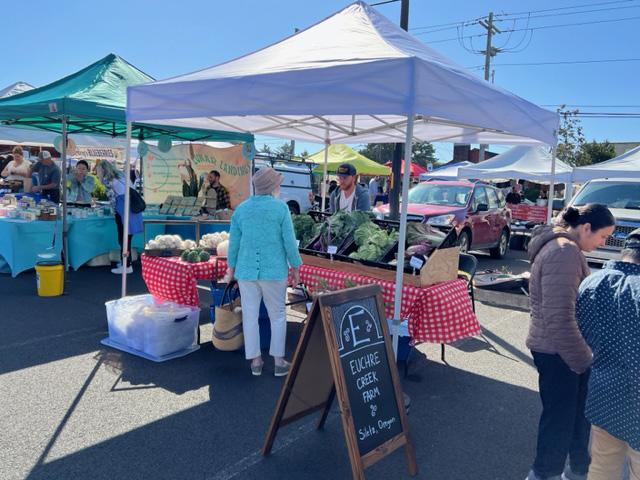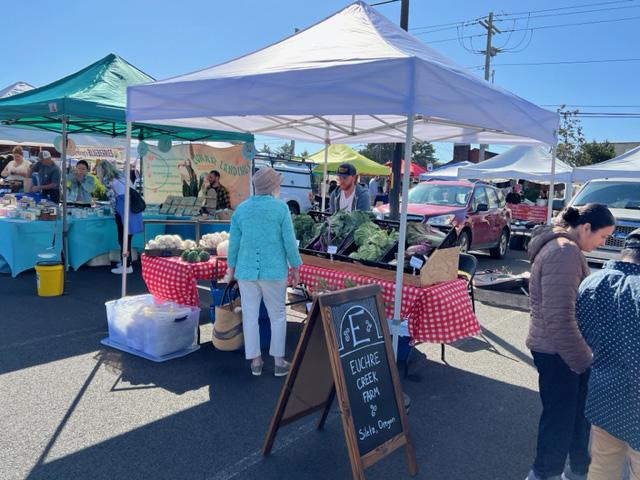An Urban's Rural View
Happy National Farmers Market Week
Any time is a good time to talk about how farmers markets benefit society, but National Farmers Market Week (Aug. 6-12) and the weeks surrounding it are an especially good time.
I feel a particular obligation to sing the praises of farmers markets. I'm a big fan. I've been to seven in recent months -- three in Oregon (Newport, Portland, and Waldport), two in Washington state (Olympia and Vancouver), one in Chicago and one in Washington, D.C.
In Newport, the coastal town where my wife and I spend summers, we take in the Newport Farmer's Market every Saturday. In years past I've described how it brings our community together here (https://www.dtnpf.com/…) and here (https://www.dtnpf.com/…).
This year, our farmers market celebrated its 45th anniversary. (https://www.newportfarmersmarket.org/…)
I voted for it in the American Farmland Trust's 2023 America's Farmers Market Celebration. (https://markets.farmland.org/…)
But there are reasons to praise farmers markets beyond that feeling of community I saluted in earlier posts. Farmers markets help unify a divided country. They bridge the urban-rural divide; there are multiple markets in big cities like Chicago and New York. They bring together, face-to-face, the very few who provide society with its food and the great many who don't.
Other than at farmers markets, where does that happen? Where else do farmers and city dwellers interact? Where else can they get to know each other? For the great majority of farmers and city dwellers, the answer is nowhere.
P[L1] D[0x0] M[300x250] OOP[F] ADUNIT[] T[]
Now, the fundamental thing the country's 8,600 farmers markets provide the public is, of course, food: fruits, vegetables and meats that are fresher, because they are more local than what's available in the supermarket. As I learned from A.G. Kawamura, who grows fruits and vegetables in Southern California and served as California's Secretary of Agriculture under Governor Arnold Schwarzenegger, the flavor and nutritional value of produce decline with each passing day.
A.G. and his brother Matt grow both organic and conventional produce. A few years ago, I asked A.G. which he serves his family. His answer: "Whatever's freshest."
Prices at farmers markets vary, but it's not unusual for them to be higher than store prices. You pay for what you get. It's not just people with money who patronize farmers markets, however.
These days, many farmers markets accept food stamps. At some, there are programs that allow low-income consumers to increase the value of their food stamps as long as they're used to buy fruits and vegetables.
These days, too, farmers market customers can often pay with credit cards. At the Newport Farmer's Market, many booths accept them. For those that don't, you can buy tokens with a credit card from the market administrator. Booths can redeem the tokens for cash.
Talking to farmers at farmers markets is a learning opportunity for non-farmers like me. One thing we learn is how hard these farmers work and how close to the financial brink many operate. Most are small operators. Many sell at more than one market per week, plus tend the crops and conduct the farm's business, sometimes without hired help.
I know farmers who've tried their hand at farmers markets and decided they're not worth the effort. Too much work, too little profit. But for small farmers, cutting out the middlemen can be the difference between profit and loss.
There are other ways of selling directly to consumers, to be sure. Among them are farm stands and Community Supported Agriculture arrangements, where customers buy a share of the farm's crop and get regular deliveries. For many small operators, though, farmers markets are the best option.
Though many successful commercial farmers don't sell at farmers markets, they benefit from them, too. That's because for millions of Americans, farmers markets are the face of agriculture.
And what an attractive face it is. A sympathetic, younger face. Walking past booths at a farmers market, you'd never guess that the average age of American farmers is 57.5 years.
These younger farmers often seem eager to answer questions about how they grow what they sell. They're engaged and engaging. As a result, a visit to a farmers market is often a leisurely affair. Unlike, say, a trip to the supermarket, where getting in and out quickly is often the aim.
There's a lot to celebrate, then, during National Farmers Market Week. We can all be thankful for the urban-rural interactions, the feeling of community and the fresh food they provide.
Most of all, though, this is the week to give a round of applause to the stars of the show, the farmers market farmers. May they prosper and grow through many more National Farmers Market weeks.
Urban Lehner can be reached at urbanize@gmail.com
(c) Copyright 2023 DTN, LLC. All rights reserved.






Comments
To comment, please Log In or Join our Community .